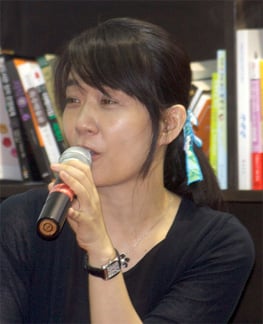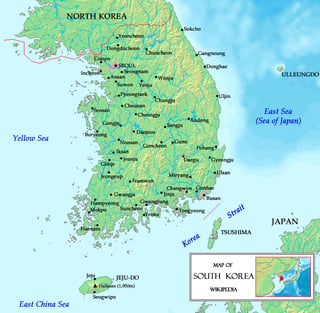You might have heard of Han Kang, and maybe you’ve read the English translation of her novel The Vegetarian (the book was published in the original Korean in 2007 with the English translation by Deborah Smith following eight years later in 2015). We’re guessing you might have at least heard of The Vegetarian since it won the 2016 Man Booker International Prize for Fiction. The novel feels, in some ways, like a work of dystopian fiction in that it follows a woman who becomes a vegetarian after experiencing violent, bloody impulses all through a narration by her husband. Threads of futuristic writing may run through Han Kang’s fiction, but her work is also deeply permeated by the past. Her most recent novel, Human Acts, reflects upon the Gwanju massacre and its meaning for Korea in the present.
Political Critique in Han’s The Vegetarian
 As we mentioned, the tone of Han’s fiction gives it the feel of surreal, dystopian writing. For instance, the nightmares of the protagonist in The Vegetarian read like this: “[G]reat blood-red gashes of meat . . . . My bloody hands. My bloody mouth.” Yet at the same time, the novel is also a critique of socially prescribed gender roles and the politics of breaking free from heteronormative domesticity. For instance, at the very start of The Vegetarian, the protagonist’s husband narrates the “problem” of his wife’s refusal to wear a bra and his attempts to constrain, at least sartorially, her body:
As we mentioned, the tone of Han’s fiction gives it the feel of surreal, dystopian writing. For instance, the nightmares of the protagonist in The Vegetarian read like this: “[G]reat blood-red gashes of meat . . . . My bloody hands. My bloody mouth.” Yet at the same time, the novel is also a critique of socially prescribed gender roles and the politics of breaking free from heteronormative domesticity. For instance, at the very start of The Vegetarian, the protagonist’s husband narrates the “problem” of his wife’s refusal to wear a bra and his attempts to constrain, at least sartorially, her body:
“I would have preferred her to go around wearing one that was thickly padded, so that I could save face in front of my acquaintances . . . . Even in the summer, when I managed to persuade her to wear one for a while, she’d have it unhooked barely a minute after leaving the house. The undone hook would be clearly visible under her thin, light-colored tops, but she wasn’t remotely concerned. I tried reproaching her, lecturing her to payer up with a vest instead of a bra in that sultry heat. She tried to justify herself by saying that she couldn’t stand wearing a bra because of the way it squeezed her breasts, and that I’d never worn one myself so I couldn’t understand how constricting it felt. Nevertheless, considering I knew for a fact that there were plenty of other women who, unlike her, didn’t have anything particularly against bras, I began to have doubts about this hypersensitivity of hers.”
Indeed, as much of Han’s language positions her in an ever-postmodern future, it also addresses the social constraints of the past and the desire to resist. It is not just The Vegetarian that looks to the future to address the past. To be sure, Human Acts more specifically contends with South Korea’s recent history of violence.
Past, Present, and Future in Human Acts
 Perhaps the greatest element of the future within Han’s fiction concerns the ways in which the violence of the past reflects upon what’s to come. For most South Koreans, the general facts of the Gwangju Uprising are well known. The Gwangju Uprising occurred in response to the massacre of students at Jeonnam University who had been demonstrating against the Chun Doo-hwan government. The authoritarian government came to power after the assassination of Korean president Park Chung-hee in 1979. Han Kang has a personal connection to Gwangju, given that she was born there just a decade before the massacre and uprising.
Perhaps the greatest element of the future within Han’s fiction concerns the ways in which the violence of the past reflects upon what’s to come. For most South Koreans, the general facts of the Gwangju Uprising are well known. The Gwangju Uprising occurred in response to the massacre of students at Jeonnam University who had been demonstrating against the Chun Doo-hwan government. The authoritarian government came to power after the assassination of Korean president Park Chung-hee in 1979. Han Kang has a personal connection to Gwangju, given that she was born there just a decade before the massacre and uprising.
According to Deborah Smith, the English translator of Han’s work from the original Korean, “when Park Chung-hee’s daughter Park Geun-hye was inaugurated as president, the past rose up and ripped the bandage off old wounds for Gwangju--its like Han Kang,” whose novel is “both a personal and political response to these recent developments, and a reminder of the human acts of which we are all capable, the brutal and the tender, the base and the sublime.”
To be sure, Human Acts may be set in the past, but it necessarily questions the future of Korea even decades after the massacre, and the lingering impact of the Gwangju Uprising in the twenty-first century. Are you interested in learning more about Han Kang’s fiction? You should pick up one of Deborah Smith’s fabulous English-language translations as soon as you can.









